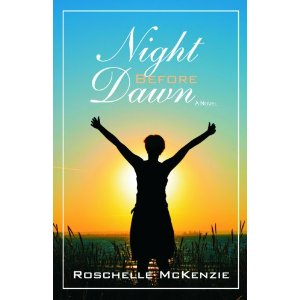 I'm a lover of words, expression and
am smitten with numerous books, but Christian fiction is a genre I seldom
explored. In my senior year of high school, I read a book that was supposedly
within the "holy" section of reads but was surprised to find a plethora of
eroticism, sexual content and vulgarity as I turned the pages. Needless to say,
I didn't have the best first impression.
I'm a lover of words, expression and
am smitten with numerous books, but Christian fiction is a genre I seldom
explored. In my senior year of high school, I read a book that was supposedly
within the "holy" section of reads but was surprised to find a plethora of
eroticism, sexual content and vulgarity as I turned the pages. Needless to say,
I didn't have the best first impression.
Roschelle McKenzie's novel Night Before Dawn, introduced me to none of the above. Set both in New York and a small town outside of Atlanta, Georgia, Sabrina--the main character and narrator--struggles to live in peace and happiness after several life-altering tragedies. Her unexplained dismissal of God and faith in the beginning and well into the middle of the story is awkward but is clarified in the final chapters after the mention of her twin brother's death.
Such a delayed resolution adds a
bit of confusion, overpowering the quality of suspense, but won't cause you to give up on the story. Other mishaps
before the mention of her brother include her disdain for her boss, her job loss, her grandmother's battle with cancer and her distant
relationship with her mother. They all simply hint at the reasons for her resentment of God, but
there is always something missing. The eventual reveal of her deceased twin brother
implies that her angst is rooted in his death.
The feeling of losing
a loved one, being betrayed by a confidant -- in Sabrina's case her fiance Eric and
best friend Monique -- and having to pick up the pieces of your life thereafter resonates with all
mankind, both Christians and non.
We find out that Sabrina was raised in the church, but forsakes her beliefs. Consumed by anger, she lives life the way she thinks is best. It is the actions and lifestyle of Claudia, her roommate, which alter her way of thinking and eventually lead her back to God.
God's mercy and grace is ultimately
praised as the novel concludes, but the manner in which the theme of hope,
faith and transformation is broached seems too forced and thus feels like an
insincere depiction of these experiences.
Besides the mention of an old woman
evangelizing on a NYC train car, which I witness on a weekly basis to date,
there are several instances when the dialogue between characters is too preachy
and generic.
During Sabrina's disclosure of her new found faith in Christ to Eric, she says:
I'm a Christian woman now and totally
committed to living the Christian lifestyle...You see, the problem was that I
had built my foundation on sand...I've realized that when we misplace the
importance of people and things in our lives, it turns into idolatry, and
eventually it will fall apart...You were the cause, Jesus is the cure. Don't
get me wrong I'm not blaming you for everything. I was the one who had the
wrong priorities in order... One thing I always want you to remember is: the
key to lasting happiness is to seek God first and everything that pleases Him.
Then, and only then, will your life fall correctly into place. And that's
Bible!
There is a bit of irony in Sabrina's life after coming to Christ. She becomes the very person she once disliked. The name of God is always on her lips, she is able to forgive others who hurt her and see past the turmoils that arise. Although plausible, the transition of this transformation occurs rather dramatically. Too dramatically. I waited with bated breath for Sabrina to come down from her "holy high."
She raves about her trust in God with pride and very little humility, proclaiming that He
was the same God she once rejected. I wasn't convinced. As the story progresses,
however, there is a peace that overcomes Sabrina's character in the midst of
temptations and hardships. It is undeniable that the difference between her present and past self is
her trust in God.
We learn that Sabrina is product of rape and sexual abuse.
It is the first time that Sabrina doesn't identify herself as a mistake, but a vessel worthy for God's use. With
a former drug-addicted mother, she doesn't filter her outlook by the events of the
past, but attempts to look ahead.
After the birth of her daughter, Dawn and
simultaneous death of her twin - who Sabrina names Joy - the narrator connects her
foreshadowed dreams, reevaluates the people who have journeyed through her
life and prepares for her future. Her heart is no longer cold, but is finally at
peace. She shares this new side of her with family and friends.
Despite my impressions, Night Before
Dawn is a good read. It evokes a good range of emotions: sorrow and joy with twists and turns,
conjuring up a laugh or two.
I rate it 2 New Yorks and a half Miami. ![]()
![]()


